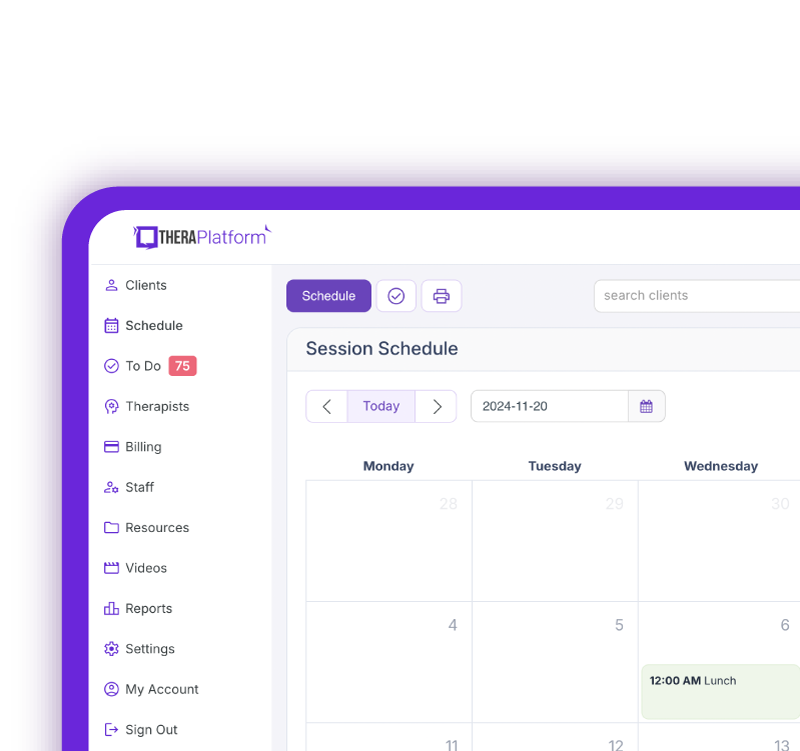AI EHR FAQs

Artificial Intelligence (AI) is quickly transforming the healthcare field, including Electronic Health Records (EHRs). Today’s EHR systems can integrate AI, offering intelligent automation, streamlined workflow, support in clinical decisions, and alleviating documentation burdens.
Summary
- AI-powered EHRs can significantly reduce documentation time by transcribing, summarizing, and structuring therapy notes, especially when integrated with specialty-specific templates like SOAP, DAP, or BIRP. Download my free notes templates.
- Accuracy, customization, and oversight are critical. Therapists should ensure the AI aligns with their clinical style, maintains compliance, and supports human review before finalizing documentation.
- Security and compliance must be non-negotiable, with HIPAA-compliant AI tools, encrypted data storage, and clear safeguards for AI-generated content.
- AI EHR costs should reflect value and ROI, factoring in time saved, improved documentation quality, and potential billing efficiency and ideally verified through demos, trials, and clinician feedback.
Streamline your practice with One EHR
- Scheduling
- Flexible notes
- Template library
- Billing & payments
- Insurance claims
- Client portal
- Telehealth
- E-fax

Although these potential benefits are exciting, therapists should carefully evaluate features of an AI EHR before adopting it. AI EHR systems differ in their true capabilities, limitations, and implications. Choosing an AI-enhanced EHR is a significant investment, and it should meet the unique needs of your practice.
In this guide, therapists and healthcare providers will learn the right questions to ask when considering an AI-powered EHR. Follow along for help on confidently choosing the right solution for your practice.
Clinical workflow and documentation for an AI EHR
One of the most significant benefits of an AI EHR for therapy practices is its potential to reduce documentation time. But just how effectively does it integrate into the workflow of a real-world clinical setting?
Does the AI reduce documentation time for intake, progress, and discharge notes?
Look for an AI EHR that can transcribe or summarize sessions in real-time (ambient clinical documentation) or convert brief notes into more comprehensive, structured documentation. Seek other time-saving features, such as AI that generates a first draft of notes you can edit as needed.
Is it compatible with templates like SOAP, DAP, or BIRP?
Therapists who typically work within a specific note format (such as SOAP notes used by Speech Therapists) should ensure that the AI EHR understands and aligns with that preferred template.
Can it auto-generate or assist with therapy-specific documentation (e.g., mental health, OT, PT, SLP)?
The AI EHR should understand specific nuances related to your specialty. The ability to generate clinically relevant, accurate content related to OT, PT, SLP, or mental health reflecting interventions, assessments, and progress is critical.
Watch this video to discover 3 smart ways AI can speed up your note-taking
→ Start My Free Trial
Accuracy and customization
AI EHR systems should help therapists save time, not spend extra time editing.
How accurate is the AI-generated content?
Consider requesting statistics on the accuracy rates for clinical notes, and ask for real examples. Can it correctly interpret the nuances of clinical language?
Can I train or customize the AI based on my clinical style or specialty?
An AI EHR that allows you to add preferred phrases and teach it common diagnoses can more accurately reflect your clinical approach.
What safeguards are in place to avoid errors in diagnosis or treatment plans?
Ensure that the AI includes built-in alerts, does not automatically generate diagnoses, and allows you to review documentation before finalizing it. Human oversight and professional judgment should remain as priorities when incorporating AI tools.
Privacy, security and compliance
Choosing an AI EHR that complies with required privacy and security standards is essential.
Is the AI HIPAA-compliant?
This is critical. Ask for proof of HIPAA compliance, and request that the platform sign a Business Associate Agreement (BAA) that states their responsibilities for safeguarding Protected Health Information (PHI).
How is client data stored, used, and protected?
Ask what the vendor’s protocols are for data encryption. What authentication measures and access controls are used? Inquire about whether any information is shared with third parties.
Are AI outputs encrypted and stored securely?
AI-generated content (such as session transcriptions and note drafts) must follow the same protections as other clinical documentation in the EHR.
Practice Management + EHR + Telehealth
Manage more in less time in your practice with TheraPlatform

Billing and coding support
In addition to helping with documentation, an AI EHR can assist with the financial side of your practice.
Does the AI suggest ICD-10 or CPT codes automatically?
Some systems provide intuitive coding suggestions based on information in therapy notes. While this could reduce coding errors, ask about the accuracy of the suggestions. Review before submission.
Can it support insurance documentation and medical necessity?
Some advanced AI can assist in generating documentation required by insurance for reimbursement, such as justification of medical necessity. The AI may be capable of creating reports that meet specific payer standards.
Integration and usability
AI tools should work seamlessly with the other features of your EHR to enhance your practice management, not complicate it.
Is the AI fully integrated with scheduling, billing, and client communication features?
Clinicians should look for a unified workflow that reduces overall manual data entry and decreases errors. Instead of a standalone system that requires toggling between apps, look for one that effectively communicates with other modules, such as telehealth platforms.
Is the system intuitive and easy to learn?
Busy providers need a system that can be quickly adopted without extensive training. Requesting a demo of the AI system can help you determine the ease of its navigation.
Is there mobile or tablet functionality?
Clinicians who prefer to use mobile devices for some tasks, offer teletherapy, or are on the go in the community should look for AI features that provide this flexibility.
Free Resources for Therapists
Click below and help yourself to peer-created resources:

Support and updates
Ongoing tech support is essential for therapists to use an AI EHR long term successfully.
What training and onboarding are provided?
Ensure you and your team are off to a strong start with comprehensive training. In-person training sessions, online tutorials, and one-on-one onboarding from support staff can help therapists acclimate to a new EHR system.
How often is the AI model updated or improved?
AI is rapidly evolving, and regular updates should be offered to maintain accuracy and address new challenges.
What support is available if the AI malfunctions?
Ensure the vendor provides a responsive technical support team to assist with any AI functionality issues you may encounter. Ask about support channels offered (chat, phone, email), escalation procedures, and response times.
Cost and value
An AI-powered EHR is an investment and should yield a tangible return.
Is AI functionality included or an add-on cost?
Obtain a detailed breakdown of costs to clarify the specific AI tools included in the EHR system. Understand the pricing structure of the system, such as whether the price is determined per user, per feature, or follows a tiered system.
How does the cost compare to time saved or ROI?
Consider the time you’ll save completing documentation, billing, and coding manually. Automated features offered by AI-powered EHR can yield faster billing cycles, improved documentation accuracy, and reduced clinician burnout. Ask the vendor for analyses of the typical return on investment (ROI) or testimonials from other clinicians.
Final Considerations
Consider these final areas before you commit to an EHR with AI.
Is there a free trial or demo?
The opportunity to participate in a comprehensive demo or utilize a free trial is invaluable. Hands-on experience with the software allows you to see how the AI integrates with your existing workflow.
What do other clinicians say about the AI EHR?
Look for testimonials and connect with other clinicians using the EHR system to gather honest feedback from users.
What’s the cancellation policy or contract length?
Before signing a contract, clarify all terms. Ask about the contract duration, and consider requesting a trial before signing a long-term contract. Understand the options for cancellation should the system not meet your expectations.
Today’s clinicians have the exciting ability to use an EHR with AI to improve efficiency, boost the accuracy of documentation and billing, and reduce time and stress. But AI should be implemented with careful consideration. It’s critical to ask the right questions before choosing an EHR with AI. Remember, an AI-powered EHR system should enhance your practice, not complicate it.
Streamline your practice with One EHR
- Scheduling
- Flexible notes
- Template library
- Billing & payments
- Insurance claims
- Client portal
- Telehealth
- E-fax

Resources
TheraPlatform is an all-in-one EHR, practice management, and teletherapy software with AI intake and notes capabilities built for therapists to help them save time on admin tasks. It offers a 30-day risk-free trial with no credit card required and supports mental and behavioral health, SLPs, OTs, and PTs in group and solo practices.
More resources
- Therapy resources and worksheets
- Therapy private practice courses
- Ultimate teletherapy ebook
- The Ultimate Insurance Billing Guide for Therapists
- The Ultimate Guide to Starting a Private Therapy Practice
- Mental health credentialing
- Insurance billing 101
- Practice management tools
- Behavioral Health tools
Free video classes
- Free on-demand insurance billing for therapist course
- Free mini video lessons to enhance your private practice
- 9 Admin tasks to automate in your private practice
References
Chang, H., Choi, J. Y., Shim, J., Kim, M., & Choi, M. (2023). Benefits of information technology in healthcare: artificial intelligence, internet of things, and personal health records. Healthcare Informatics Research, 29(4), 323-333. https://synapse.koreamed.org/articles/1516084704
Chustecki, M. (2024). Benefits and risks of AI in health care: Narrative review. Interactive Journal of Medical Research, 13(1), e53616. https://i-jmr.org/2024/1/e53616
Ye, J., Woods, D., Jordan, N., & Starren, J. (2024). The role of artificial intelligence for the application of integrating electronic health records and patient-generated data in clinical decision support. AMIA Summits on Translational Science Proceedings, 2024, 459. https://pmc.ncbi.nlm.nih.gov/articles/PMC11141850
FAQs about AI EHRs
How can AI help with therapy documentation?
AI-powered EHRs can transcribe, summarize, and structure notes in formats like SOAP, DAP, or BIRP, saving therapists significant time while improving accuracy.
Is an AI EHR secure and HIPAA-compliant?
Always confirm that the vendor provides HIPAA compliance, data encryption, and a signed Business Associate Agreement (BAA) to protect client information.
What should therapists consider before choosing an AI EHR?
Look at accuracy, customization, workflow integration, support, costs, and ROI. Request demos or free trials to see how well it fits your practice.



